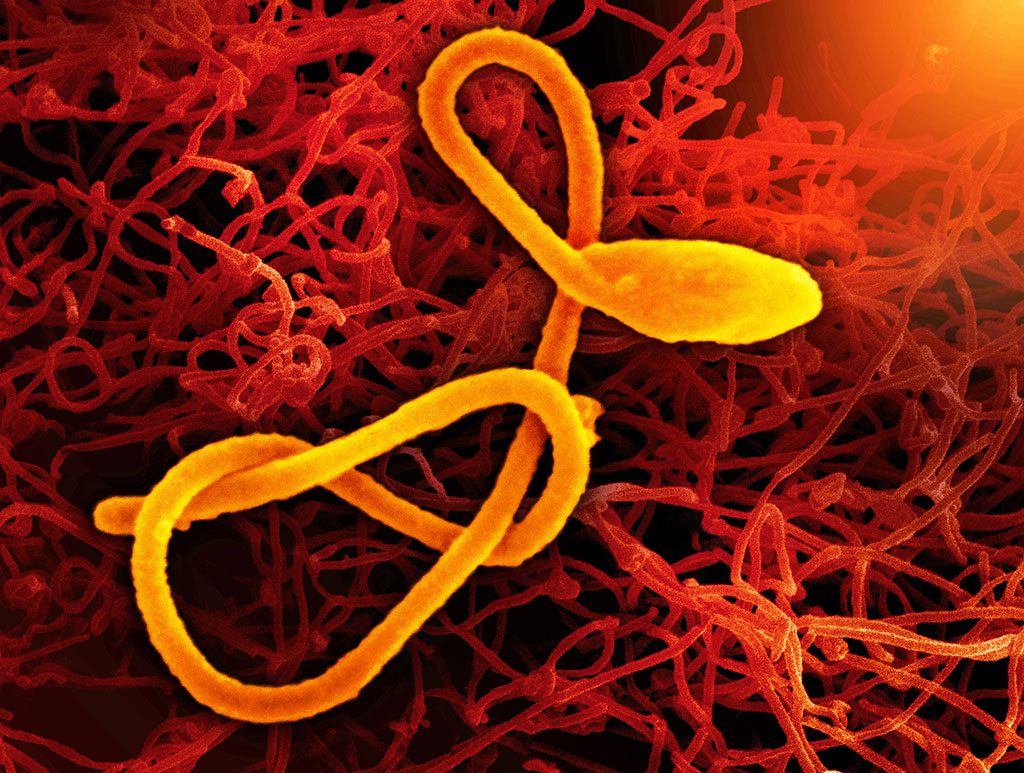A Sudan ebolavirus vaccine and antibody therapeutic tested at Texas Biomedical Research Institute have been sent to Uganda as part of efforts to control the outbreak there.
Sudan ebolavirus is one of six known species of Ebola, with a fatality rate ranging between 41% and 100%. While an Ebola vaccine now exists, it is effective against the Zaire species, not the closely related Sudan species currently affecting Uganda.
The World Health Organization and other global entities announced in November they are working with Ugandan officials to distribute Sudan ebolavirus vaccine candidates in clinical trials. One of those candidates, currently being developed by Sabin Vaccine Institute, has been undergoing preclinical testing at Texas Biomed to evaluate safety and efficacy, and an initial shipment of the vaccine is now in Uganda. The Institute has also been subcontracted by Mapp Biopharmaceutical Inc. to support the development of its antibody therapeutic, MBP134, which has been deployed to the region to treat infected patients.
Development of the vaccine and antibody candidates is currently being funded in whole or in part by the U.S. Department of Health and Human Services, Administration for Strategic Preparedness and Response, Biomedical Advanced Research and Development Authority (BARDA). Texas Biomed has been awarded more than $35 million in new subcontracts to run detailed studies required by the FDA to determine if Sudan ebolavirus vaccines and therapies are effective.
Texas Biomed’s contract research enterprise has tripled in the last three years due in large part to its specialized expertise and facilities.
Work on these deadly viruses must be carried out in a biosafety level 4 (BSL-4) laboratory, which is the highest, most secure level in which researchers wear full body, pressurized suits. Texas Biomed is home to the nation’s first independently operated BSL-4, which opened in 1999.
“There are only a few labs that can perform the regulated and specialized studies required by FDA to support approval of a vaccine or treatment for these types of pathogens,” explains Ricardo Carrion, Jr., PhD, who directs Texas Biomed’s Maximum Containment Contract Research unit.
The Institute also hosts the Southwest National Primate Research Center, one of seven supported by the U.S. government. Over the past decade, Texas Biomed has worked to establish the animal models required to study these viruses and conduct the studies that provide the foundational information for a vaccine or therapy that may go to FDA for review.
“Our work to characterize and establish relevant models helps the pharmaceutical companies move their vaccines and therapies forward faster, because we’ve done the first part for them, providing the baseline information about the virus in the animal models.”
Kendra Alfson, PhD, Texas Biomed Staff Scientist and first author of the paper describing the Sudan ebolavirus animal model
Studying vaccines and therapies for such deadly pathogens presents challenges in humans. While a vaccine or therapy can be given to people to confirm it is safe, determining effectiveness requires exposure to the virus. Deliberately exposing people would be unethical, and outbreaks are sporadic and limited in size. Therefore, in-depth studies in nonhuman primates are the gold standard to evaluate how a full body and immune system react to a vaccine or therapy and determine the most effective dosages. The FDA can approve new drugs and vaccines using efficacy data from animals in these cases.
In rare instances, like with previous Ebola outbreaks and the ongoing Sudan ebolavirus outbreak, if vaccines have already undergone rigorous efficacy testing in animals and initial safety testing in humans, it is possible to administer experimental vaccines to people before they have received formal approval, and document how well they help control the spread.
Even as this happens, vital details must still be collected from animal models, including specifically defining what biological markers equal protection against the disease after receiving the vaccine, how soon protection kicks in post vaccination, and how long protection lasts.
“Critical information like this can only be gathered in tightly controlled laboratory settings, not from human patients,” explains Dr. Carrion. “We are proud to help contribute this knowledge so our partners can develop effective tools that will protect people from these deadly viruses, especially as outbreaks become more common.”
Development of a Well-Characterized Cynomolgus Macaque Model of Sudan Virus Disease for Support of Product Development. Vaccines, 15 October 2022.
The primary objective of this study was to characterize the disease course in cynomolgus macaques exposed to Sudan virus (SUDV), to determine if infection in this species is an appropriate model for the evaluation of filovirus countermeasures under the FDA Animal Rule. The data in this study support the observation that IM exposure of cynomolgus macaques to a target dose of 1000 PFU SUDV Gulu results in a rapid systemic disease similar to the infection in humans. For future vaccine and therapeutic studies using this model: survival, serum viral load, body temperature, and clinical chemistry values (e.g., CRP) should be considered when determining primary and secondary endpoints, as these parameters appear to be the most indispensable.
READ ALSO:
Texas Biomed Wins Designation That Positions it for $100M in Funding
The Biomedical Advanced Research and Development Authority, the federal agency responsible for the procurement and development of medical countermeasures against bioterrorism, has elevated Texas Bio to the top ranks of its national readiness and preparedness network. As a result, San Antonio-based Texas Biomed is now classified as a prime contractor and will have access to a portfolio of up to $100 million in funding over five years through BARDA. (13 Dec 2022 – San Antonio Business Journal)


